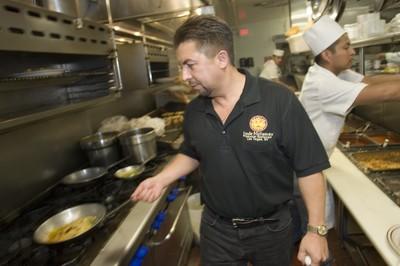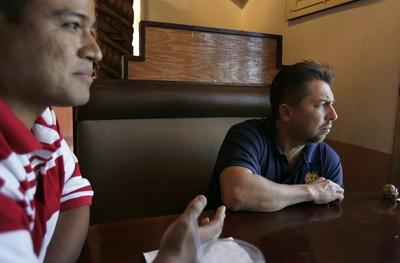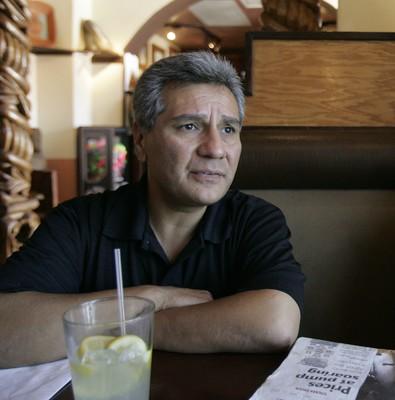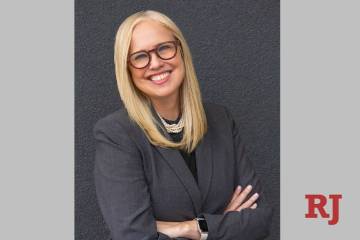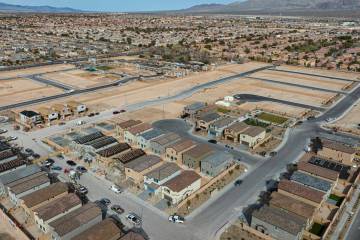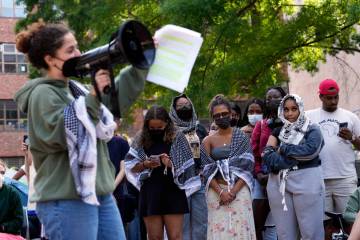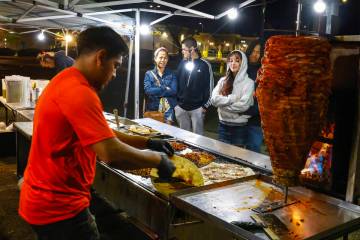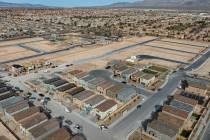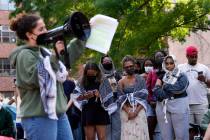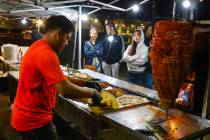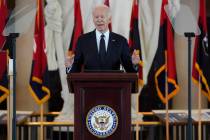Immigrants’ dreams fulfilled
Javier Barajas as a child watched one young man after another head north to find work, then return home for Christmas in a shiny new car.
To a boy from Turicato, west of Mexico City, it seemed the biggest dream available. So he decided he too would travel to the United States, even if he had to do so illegally.
Better than a flashy new car for himself, he thought, work in America would allow him to some day purchase a pickup for his hard-working father, who ran a small grocery store.
Barajas, at 16, headed from the state of Michoacan to the border with an uncle hoping to find work picking grapes.
After 10 attempted crossings in Arizona and California that ended with Border Patrol agents escorting him and his uncle back to Mexico, Barajas finally landed in the United States.
He bought a bus ticket, he thought, to Los Angeles. He wound up instead in downtown Las Vegas.
He's still here more than 30 years later.
Barajas has fulfilled his dreams and then some during those years. He owns his own restaurant, Lindo Michoacan on Desert Inn Road, and eight Nevada money wire-transfer businesses.
He joined friends and fellow businessmen Miguel Ortiz and Gustavo Gutierrez before the lunch rush Tuesday at his restaurant. They said many people don't realize how many formerly illegal immigrants are productive U.S. citizens entrenched in their communities.
Ortiz, like Barajas, is a former illegal immigrant.
Gutierrez's parents came to the United States illegally decades ago.
All three men are now citizens. They all speak English, have nine American-born children among them, and have no plans to again live outside the United States.
"This is my country," said Barajas, who after crossing the border got work at a gas station.
From there, he landed a job washing dishes at a restaurant, then moved up to head chef. He saved money and was able to buy his own restaurant, becoming a citizen years ago after marrying an American.
The friends talked about current events, the country's political climate, the war in Iraq. Gutierrez's 27-year-old son is serving his second tour of duty there.
They also offered their perspectives on the immigration debate raging across the nation.
"I see both sides. I want the best for the country, but ... I know how hard it is in Mexico," Barajas said.
"A lot of Hispanics are torn," said Gutierrez, president and CEO of Tortillas Inc., a nearly 30-year-old local company that provides tortillas to hotel-casinos, the King Ranch Markets and the Ricardo's restaurant chain.
The business was small when Gutierrez joined his parents after crossing the border. But, he said, it had "staying power."
"You see the stereotype of illegal immigrants, but the majority are people looking for work, to do positive things."
The men's political views may surprise some. Gutierrez and Barajas describe themselves as "die-hard Republicans."
"(Ronald) Reagan is my hero," Barajas said.
They all see the need for comprehensive immigration reform and to tighten security at the U.S.-Mexico border.
As Americans, they share the frustration of waiting for Congress to act on the issue. But they also don't want to deny anybody the opportunities they had.
"Everybody should have the opportunity to raise themselves up," said Ortiz, 30, who in 1999 came to the United States from Aguascalientes in central Mexico on a temporary visa.
He overstayed that visa and lived illegally in the country until, like Barajas, he married an American.
Ortiz started out working in a travel agency. He and his wife now run two local travel agencies.
The men said some provisions of an immigration plan being considered by the Senate are unworkable or unfair.
They don't like the proposal that would require illegal immigrants to return to their home countries before applying for permanent residency.
"You shouldn't have to leave the country," Gutierrez said. "If you have to register, OK. The question should be, 'Do you have a job?'"
But, he said, illegal immigrants who have criminal records should not be allowed to stay. "Get out of here. We want people who have strong family values."
Gutierrez said Mexicans are known for their strong family ties.
"In America, it's, 'You're 18. You're on your own,'" he said. "For Mexicans, at 18, it's, 'Mom, how can I take care of you?'"
The men also don't like the part of the plan that would place more emphasis on education and skills than on family ties when deciding who can enter the country.
"It really doesn't take that much skill to pack tortillas into a bag, and you can't pay $15 an hour to do it," Gutierrez said.
Barajas said that part of the plan would unfairly punish small businesses who depend on low-skilled workers.
"Who's going to wash my dishes? Congress needs to think about small businesses too."
That kind of shift would have made it more difficult for Barajas to bring most of his immediate family, including his parents, to the United States. That's been one of the best parts of becoming successful in America, Barajas said.
He also couldn't have imagined that kind of success when, more than three decades ago, Barajas and his uncle finally resorted to hiring a coyote, or human smuggler, to lead them on a nighttime hike across the border into California.
Not long after they arrived on U.S. soil, Border Patrol agents swooped in.
Barajas' uncle was apprehended, but Barajas hid in the bushes and wasn't caught.
He arrived in Las Vegas alone, exhausted, nearly broke and unable to speak English.
Still, Barajas said, he would do it all again.
"I had a lot of dreams, and I knew in Mexico I couldn't do them. It's almost impossible to realize a dream over there."
The United States allowed him to achieve one of his most important dreams. It has become his favorite memory. He bought his father that new truck after three years in America.
"Watching him drive that truck," Barajas said, placing a hand over his heart, "It was a very good feeling."



